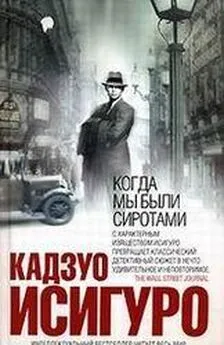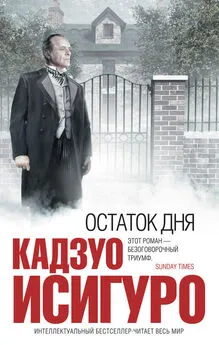Кадзуо Исигуро - Остаток дня / The Remains of the Day
- Название:Остаток дня / The Remains of the Day
- Автор:
- Жанр:
- Издательство:неизвестно
- Год:2020
- Город:Москва
- ISBN:978-5-04-112761-9
- Рейтинг:
- Избранное:Добавить в избранное
-
Отзывы:
-
Ваша оценка:
Кадзуо Исигуро - Остаток дня / The Remains of the Day краткое содержание
«Остаток дня» – дневник дворецкого, жизнь с точки зрения Бэрримора. В основе его стилистики лежит сдержанность, выявляющая себя в самой механике речи. Герой не считает возможным проявлять свои чувства, и на лингвистическом уровне эта своеобразная аскеза приводит к замечательным результатам – перед нами этакая оборотная сторона Достоевского с его неуправляемым потоком эмоций.
В 1989 году за «Остаток дня» Исигуро единогласно получил Букера (и это было, пожалуй, единственное решение Букеровского комитета за всю историю премии, ни у кого не вызвавшее протеста). Одноименная экранизация Джеймса Айвори с Энтони Хопкинсом в главной роли пользовалась большим успехом.
А Борис Акунин написал своего рода римейк «Остатка дня» – роман «Коронация».
В формате a4-pdf сохранен издательский макет книги.
Остаток дня / The Remains of the Day - читать онлайн бесплатно ознакомительный отрывок
Интервал:
Закладка:
‘I’m very sorry, sir, but there appears to be a tiger in the dining room. Perhaps you will permit the twelve-bores to be used?’
And according to legend, a few minutes later, the employer and his guests heard three gun shots. When the butler reappeared in the drawing room some time afterwards to refresh the teapots, the employer had inquired if all was well.
‘Perfectly fine, thank you, sir,’ had come the reply. ‘Dinner will be served at the usual time and I am pleased to say there will be no discernible traces left of the recent occurrence by that time.’
This last phrase – ‘no discernible traces left of the recent occurrence by that time’ – my father would repeat with a laugh and shake his head admiringly. He neither claimed to know the butler’s name, nor anyone who had known him, but he would always insist the event occurred just as he told it. In any case, it is of little importance whether or not this story is true; the significant thing is, of course, what it reveals concerning my father’s ideals. For when I look back over his career, I can see with hindsight that he must have striven throughout his years somehow to become that butler of his story. And in my view, at the peak of his career, my father achieved his ambition. For although I am sure he never had the chance to encounter a tiger beneath the dining table, when I think over all that I know or have heard concerning him, I can think of at least several instances of his displaying in abundance that very quality he so admired in the butter of his story.
One such instance was related to me by Mr David Charles, of the Charles and Redding Company, who visited Darlington Hall from time to time during Lord Darlington’s days. It was one evening when I happened to be valeting him, Mr Charles told me he had come across my father some years earlier while a guest at Loughborough House – the home of Mr John Silvers, the industrialist, where my father served for fifteen years at the height of his career. He had never been quite able to forget my father, Mr Charles told me, owing to an incident that occurred during that visit.
One afternoon, Mr Charles to his shame and regret had allowed himself to become inebriated in the company of two fellow guests – gentlemen I shall merely call Mr Smith and Mr Jones since they are likely to be still remembered in certain circles. After an hour or so of drinking, these two gentlemen decided they wished to go for an afternoon drive around the local villages – a motor car around this time still being something of a novelty. They persuaded Mr Charles to accompany them, and since the chauffeur was on leave at that point, enlisted my father to drive the car.
Once they had set off, Mr Smith and Mr Jones, for all their being well into their middle years, proceeded to behave like schoolboys, singing coarse songs and making even coarser comments on all they saw from the window. Furthermore, these gentlemen had noticed on the local map three villages in the vicinity called Morphy, Saltash and Brigoon. Now I am not entirely sure these were the exact names, but the point was they reminded Mr Smith and Mr Jones of the music hall act, Murphy, Saltman and Brigid the Cat, of which you may have heard. Upon noticing this curious coincidence, the gentlemen then gained an ambition to visit the three villages in question – in honour, as it were, of the music hall artistes. According to Mr Charles, my father had duly driven to one village and was on the point of entering a second when either Mr Smith or Mr Jones noticed the village was Brigoon – that is to say the third, not the second, name of the sequence. They demanded angrily that my father turn the car immediately so that the villages could be visited ‘in the correct order’. It so happened that this entailed doubling back a considerable way of the route, but, so Mr Charles assures me, my father accepted the request as though it were a perfectly reasonable one, and in general, continued to behave with immaculate courtesy.
But Mr Smith’s and Mr Jones’s attention had now been drawn to my father and no doubt rather bored with what the view outside had to offer, they proceeded to amuse themselves by shouting out unflattering remarks concerning my father’s ‘mistake’. Mr Charles remembered marvelling at how my father showed not one hint of discomfort or anger, but continued to drive with an expression balanced perfectly between personal dignity and readiness to oblige. My father’s equanimity was not, however, allowed to last. For when they had wearied of hurling insults at my father’s back, the two gentlemen began to discuss their host – that is to say, my father’s employer, Mr John Silvers. The remarks grew ever more debased and treacherous so that Mr Charles – at least so he claimed – was obliged to intervene with the suggestion that such talk was bad form. This view was contradicted with such energy that Mr Charles, quite aside from worrying whether he would become the next focus of the gentlemen’s attention, actually thought himself in danger of physical assault. But then suddenly, following a particularly heinous insinuation against his employer, my father brought the car to an abrupt halt. It was what happened next that had made such an indelible impression upon Mr Charles.
The rear door of the car opened and my father was observed to be standing there, a few steps back from the vehicle, gazing steadily into the interior. As Mr Charles described it, all three passengers seemed to be overcome as one by the realization of what an imposing physical force my father was. Indeed, he was a man of some six feet three inches, and his countenance, though reassuring while one knew he was intent on obliging, could seem extremely forbidding viewed in certain other contexts. According to Mr Charles, my father did not display any obvious anger. He had, it seemed, merely opened the door. And yet there was something so powerfully rebuking and at the same time so unassailable about his figure looming over them that Mr Charles’s two drunken companions seemed to cower back like small boys caught by the farmer in the act of stealing apples.
My father had proceeded to stand there for some moments, saying nothing, merely holding open the door. Eventually, either Mr Smith or Mr Jones had remarked:
‘Are we not going on with the journey?’
My father did not reply, but continued to stand there silently, neither demanding disembarkation nor offering any clue as to his desires or intentions. I can well imagine how he must have looked that day, framed by the doorway of the vehicle, his dark, severe presence quite blotting out the effect of the gentle Hertfordshire scenery behind him. Those were, Mr Charles recalls, strangely unnerving moments during which he too, despite not having participated in the preceding behaviour, felt engulfed with guilt. The silence seemed to go on interminably, before either Mr Smith or Mr Jones found it in him to mutter:
‘I suppose we were talking a little out of turn there. It won’t happen again.’
A moment to consider this, then my father had closed the door gently, returned to the wheel and had proceeded to continue the tour of the three villages – a tour, Mr Charles assured me, that was completed thereafter in near-silence.
Now that I have recalled this episode, another event from around that time in my father’s career comes to mind which demonstrates perhaps even more impressively this special quality he came to possess. I should explain here that I am one of two brothers – and that my elder brother, Leonard, was killed during the Southern African War while I was still a boy. Naturally, my father would have felt this loss keenly; but to make matters worse, the usual comfort a father has in these situations – that is, the notion that his son gave his life gloriously for king and country – was sullied by the fact that my brother had perished in a particularly infamous manoeuvre. Not only was it alleged that the manoeuvre had been a most un-British attack on civilian Boer settlements, overwhelming evidence emerged that it had been irresponsibly commanded with several floutings of elementary military precautions, so that the men who had died – my brother among them – had died quite needlessly. In view of what I am about to relate, it would not be proper of me to identify the manoeuvre any more precisely, though you may well guess which one I am alluding to if I say that it caused something of an uproar at the time, adding significantly to the controversy the conflict as a whole was attracting. There had been calls for the removal, even the court-martialling, of the general concerned, but the army had defended the latter and he had been allowed to complete the campaign. What is less known is that at the close of the Southern African conflict, this same general had been discreetly retired, and he had then entered business, dealing in shipments from Southern Africa. I relate this because some ten years after the conflict, that is to say when the wounds of bereavement had only superficially healed, my father was called into Mr John Silvers’s study to be told that this very same personage – I will call him simply ‘the General’ – was due to visit for a number of days to attend a house party, during which my father’s employer hoped to lay the foundations of a lucrative business transaction. Mr Silvers, however, had remembered the significance the visit would have for my father, and had thus called him in to offer him the option of taking several days’ leave for the duration of the General’s stay.
My father’s feelings towards the General were, naturally, those of utmost loathing; but he realized too that his employer’s present business aspirations hung on the smooth running of the house party – which with some eighteen or so people expected would be no trifling affair. My father thus replied to the effect that while he was most grateful that his feelings had been taken into account, Mr Silvers could be assured that service would be provided to the usual standards.
As things turned out, my father’s ordeal proved even worse than might have been predicted. For one thing, any hopes my father may have had that to meet the General in person would arouse a sense of respect or sympathy to leaven his feelings against him proved without foundation. The General was a portly, ugly man, his manners were not refined, and his talk was conspicuous for an eagerness to apply military similes to a very wide variety of matters. Worse was to come with the news that the gentleman had brought no valet, his usual man having fallen ill. This presented a delicate problem, another of the house guests being also without his valet, raising the question as to which guest should be allocated the butler as valet and who the footman. My father, appreciating his employer’s position, volunteered immediately to take the General, and thus was obliged to suffer intimate proximity for four days with the man he detested. Meanwhile, the General, having no idea of my father’s feelings, took full opportunity to relate anecdotes of his military accomplishments – as of course many military gentlemen are wont to do to their valets in the privacy of their rooms. Yet so well did my father hide his feelings, so professionally did he carry out his duties, that on his departure the General had actually complimented Mr John Silvers on the excellence of his butler and had left an unusually large tip in appreciation – which my father without hesitation asked his employer to donate to a charity.
I hope you will agree that in these two instances I have cited from his career – both of which I have had corroborated and believe to be accurate – my father not only manifests, but comes close to being the personification itself, of what the Hayes Society terms ‘dignity in keeping with his position’. If one considers the difference between my father at such moments and a figure such as Mr Jack Neighbours even with the best of his technical flourishes, I believe one may begin to distinguish what it is that separates a ‘great’ butler from a merely competent one. We may now understand better, too, why my father was so fond of the story of the butler who failed to panic on discovering a tiger under the dining table; it was because he knew instinctively that somewhere in this story lay the kernel of what true ‘dignity’ is. And let me now posit this: ‘dignity’ has to do crucially with a butler’s ability not to abandon the professional being he inhabits. Lesser butlers will abandon their professional being for the private one at the least provocation. For such persons, being a butler is like playing some pantomime role; a small push, a slight stumble, and the façade will drop off to reveal the actor underneath. The great butlers are great by virtue of their ability to inhabit their professional role and inhabit it to the utmost; they will not be shaken out by external events, however surprising, alarming or vexing. They wear their professionalism as a decent gentleman will wear his suit: he will not let ruffians or circumstance tear it off him in the public gaze; he will discard it when, and only when, he wills to do so, and this will invariably be when he is entirely alone. It is, as I say, a matter of ‘dignity’.
Читать дальшеИнтервал:
Закладка:
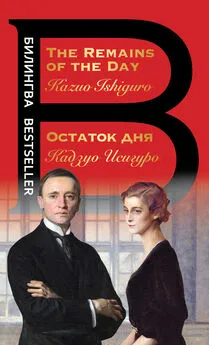
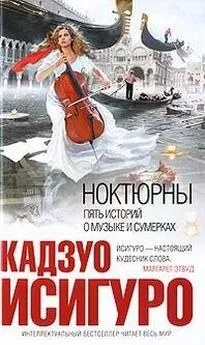

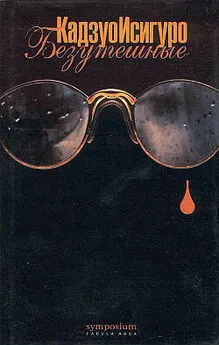
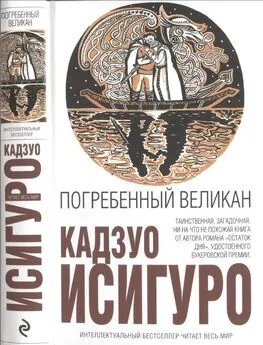
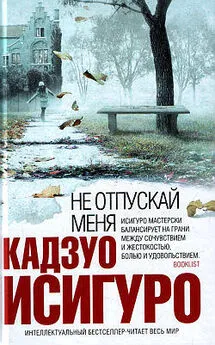
![Кадзуо Исигуро - Не отпускай меня [litres]](/books/1095846/kadzuo-isiguro-ne-otpuskaj-menya-litres.webp)
